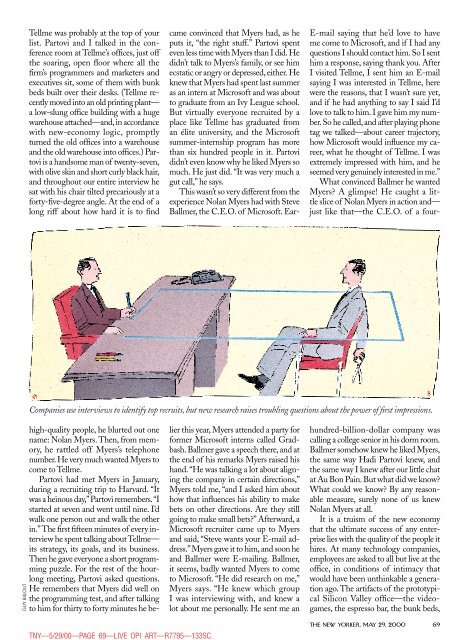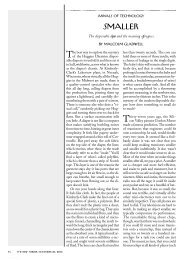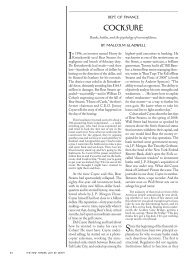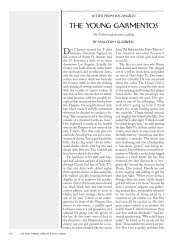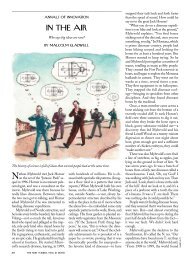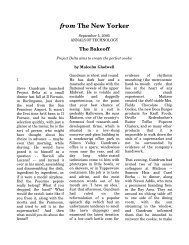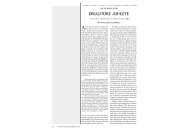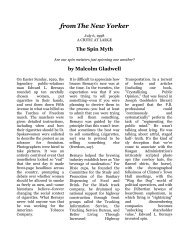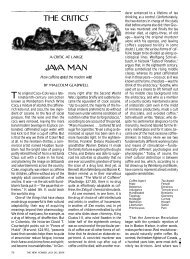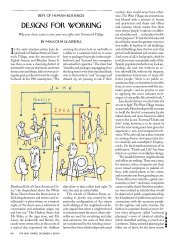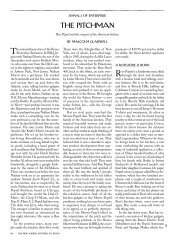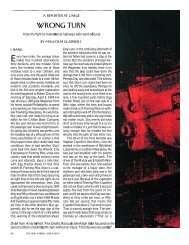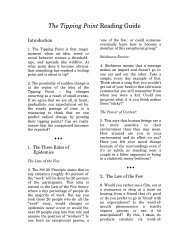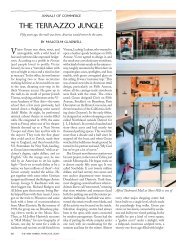The New-Boy Network - Malcolm Gladwell
The New-Boy Network - Malcolm Gladwell
The New-Boy Network - Malcolm Gladwell
Create successful ePaper yourself
Turn your PDF publications into a flip-book with our unique Google optimized e-Paper software.
GUY BILLOUT Companies use interviews to identify top recruits, but new research raises troubling questions about the power of first impressions.<br />
Tellme was probably at the top of your<br />
list. Partovi and I talked in the conference<br />
room at Tellme’s offices, just off<br />
the soaring, open floor where all the<br />
firm’s programmers and marketers and<br />
executives sit, some of them with bunk<br />
beds built over their desks. (Tellme recently<br />
moved into an old printing plant—<br />
a low-slung office building with a huge<br />
warehouse attached—and,in accordance<br />
with new-economy logic, promptly<br />
turned the old offices into a warehouse<br />
and the old warehouse into offices.) Partovi<br />
is a handsome man of twenty-seven,<br />
with olive skin and short curly black hair,<br />
and throughout our entire interview he<br />
sat with his chair tilted precariously at a<br />
forty-five-degree angle. At the end of a<br />
long riff about how hard it is to find<br />
high-quality people, he blurted out one<br />
name: Nolan Myers. <strong>The</strong>n, from memory,<br />
he rattled off Myers’s telephone<br />
number. He very much wanted Myers to<br />
come to Tellme.<br />
Partovi had met Myers in January,<br />
during a recruiting trip to Harvard. “It<br />
was a heinous day,” Partovi remembers.“I<br />
started at seven and went until nine. I’d<br />
walk one person out and walk the other<br />
in.” <strong>The</strong> first fifteen minutes of every interview<br />
he spent talking about Tellme—<br />
its strategy, its goals, and its business.<br />
<strong>The</strong>n he gave everyone a short programming<br />
puzzle. For the rest of the hourlong<br />
meeting, Partovi asked questions.<br />
He remembers that Myers did well on<br />
the programming test, and after talking<br />
to him for thirty to forty minutes he be-<br />
TNY—5/29/00—PAGE 69—LIVE OPI ART—R7795—133SC.<br />
came convinced that Myers had, as he<br />
puts it, “the right stuff.” Partovi spent<br />
even less time with Myers than I did. He<br />
didn’t talk to Myers’s family, or see him<br />
ecstatic or angry or depressed, either. He<br />
knew that Myers had spent last summer<br />
as an intern at Microsoft and was about<br />
to graduate from an Ivy League school.<br />
But virtually everyone recruited by a<br />
place like Tellme has graduated from<br />
an élite university, and the Microsoft<br />
summer-internship program has more<br />
than six hundred people in it. Partovi<br />
didn’t even know why he liked Myers so<br />
much. He just did. “It was very much a<br />
gut call,” he says.<br />
This wasn’t so very different from the<br />
experience Nolan Myers had with Steve<br />
Ballmer, the C.E.O. of Microsoft. Ear-<br />
lier this year, Myers attended a party for<br />
former Microsoft interns called Gradbash.<br />
Ballmer gave a speech there, and at<br />
the end of his remarks Myers raised his<br />
hand. “He was talking a lot about aligning<br />
the company in certain directions,”<br />
Myers told me, “and I asked him about<br />
how that influences his ability to make<br />
bets on other directions. Are they still<br />
going to make small bets?” Afterward, a<br />
Microsoft recruiter came up to Myers<br />
and said, “Steve wants your E-mail address.”<br />
Myers gave it to him, and soon he<br />
and Ballmer were E-mailing. Ballmer,<br />
it seems, badly wanted Myers to come<br />
to Microsoft. “He did research on me,”<br />
Myers says. “He knew which group<br />
I was interviewing with, and knew a<br />
lot about me personally. He sent me an<br />
E-mail saying that he’d love to have<br />
me come to Microsoft, and if I had any<br />
questions I should contact him. So I sent<br />
him a response, saying thank you. After<br />
I visited Tellme, I sent him an E-mail<br />
saying I was interested in Tellme, here<br />
were the reasons, that I wasn’t sure yet,<br />
and if he had anything to say I said I’d<br />
love to talk to him. I gave him my number.<br />
So he called, and after playing phone<br />
tag we talked—about career trajectory,<br />
how Microsoft would influence my career,<br />
what he thought of Tellme. I was<br />
extremely impressed with him, and he<br />
seemed very genuinely interested in me.”<br />
What convinced Ballmer he wanted<br />
Myers? A glimpse! He caught a little<br />
slice of Nolan Myers in action and—<br />
just like that—the C.E.O. of a four-<br />
hundred-billion-dollar company was<br />
calling a college senior in his dorm room.<br />
Ballmer somehow knew he liked Myers,<br />
the same way Hadi Partovi knew, and<br />
the same way I knew after our little chat<br />
at Au Bon Pain. But what did we know?<br />
What could we know? By any reasonable<br />
measure, surely none of us knew<br />
Nolan Myers at all.<br />
It is a truism of the new economy<br />
that the ultimate success of any enterprise<br />
lies with the quality of the people it<br />
hires. At many technology companies,<br />
employees are asked to all but live at the<br />
office, in conditions of intimacy that<br />
would have been unthinkable a generation<br />
ago. <strong>The</strong> artifacts of the prototypical<br />
Silicon Valley office—the videogames,<br />
the espresso bar, the bunk beds,<br />
THE NEW YORKER, MAY 29, 2000 69


